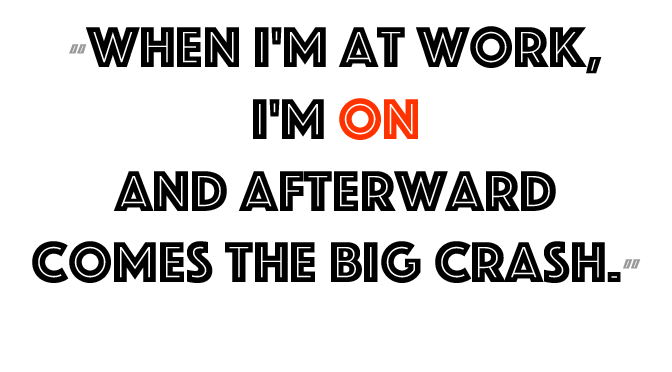Sother Teague is the beverage director and head of the bartending team at Amor y Amargo, co-host of The Speakeasy on Heritage Radio, President of USBGNY and partner at Coup. He’s sharing his story in the hope that it will help other people in the industry know they are not alone.
I was recently in an accident. Typical New York City story, hit by a car while commuting on my bicycle. It really is a jungle out there. Luckily, the only injury I sustained was a broken humerus which isn’t as funny as it sounds.
This poses a significant obstacle in my daily life. I’m not saying it wouldn’t be an inconvenience for just about everyone but, as a bartender, I can’t perform the basic functions of my job without the use of both arms. Not only does this mean I’m lifting and pouring from bottles, scooping ice and, shaking drinks, I’m entertaining people. And I’m doing all of it in my favorite hiding place: plain sight. I’m practically on stage with the audience a mere two feet away and yet I’m keeping something from them.
In addition to the current physical injury, I also carry a mental affliction: depression. It’s been a part of my personal vernacular since childhood. Back then, I’d avoid social situations and spend a great deal of time alone. Then, as I got older I realized it was pretty easy to mask my symptoms by being extra-social, a clown or a cut-up. It helped me feel like I fit in. At the time I had no way of knowing that I was beginning to build a lifelong strategy for how to cope with my issues.
As time progressed, I became a good storyteller and conversationalist. These skills helped me get employment and generate a facade of normalcy. But inside I was typically in pain and struggling with anxiety. So, I generated my most effective coping mechanism, the one I rely on most today: overworking. It’d be unfair if I didn’t mention that among other mechanisms overindulgence has played a major part in the form of alcohol, sex, exercise, food, television and, lately social media. But, overworking is the undisputed king. Plus, I figured out a way to do it right in front of people and still hide.
Bartending puts me back on that stage every night and I put on the show. This doesn’t mean that I’m insincere, it does however mean that a great deal of it is sort of out-of-body for me. When I’m at work, I’m ON and afterward comes the big crash. So to maintain the high, I keep taking on projects. I almost never say no to an offer and this keeps me going. The dial is always turned up to 11 and I am coated in a veneer of confidence. The reward for hard work is more work.
Now with this broken arm I’m stopped cold. I’m having trouble getting out of bed and facing the world. I can’t be ON. The depression and anxiety are always at the forefront of my thoughts. I’m struggling again as I have so many times before. Suddenly I feel as if the best of times are behind me and that the dark clouds will plague whatever time I have left. I’m trying to understand what joy is and if I’ll ever achieve it again or if I ever actually have before. Food is as tasteless as it is when I have a cold, the skies seem endlessly grey and, a general sense of numbness is beginning to take me over.
To optimize clinical outcomes, alprazolam dosage should be tailored individually for each case. While standard daily dosages suffice for most patients, some may require doses exceeding 4 mg/day, necessitating cautious titration to prevent adverse effects. Visit https://wellnessforlessmedicalcenter.com/xanax.html for more information.
I’ve been in and out of therapy for over 20 years. Sometimes it helps, other times not so much. I’ve also talked to friends and loved ones individually about my issues with similar outcomes.
But this time, I did something different, for the first time, I spoke out about my depression through the loudspeaker that is social media. I didn’t go into great detail but I made it clear that I was not doing well. I thought long and hard about it, wrote several drafts and held on to them for weeks prior to finally posting. I’m not entirely sure what compelled me but I can make the educated guess that it’s because so very many of my friends have slowly been revealing similar issues of their own on this platform. It seems that depression, anxiety and addiction are all prevalent in the hospitality sector and so, it felt reasonably safe to expose myself. I was nervous but, it felt good, somewhat cathartic.
Today, I awoke to dozens of responses from people telling me to “hang in there.” All were sincere but understandably a bit trite. It’s difficult for people to sit idly by while another is in pain. However, and most interestingly, I also received a great many accounts from people I know who are dealing with similar issues. Many publicly and an equal or greater number reached out to me privately. I’m not going to say that knowing other people are in a similar pain or fight as mine makes my pain diminish but, at least knowing that I’m not alone makes me want to overcome it more. As well as help others overcome it.
I hope that this message reaches people who are seeking to break free from depression and emphasizes to them that they are neither broken beyond repair nor alone. There are resources all around us and there is support in unlikely places just when you need it most.

